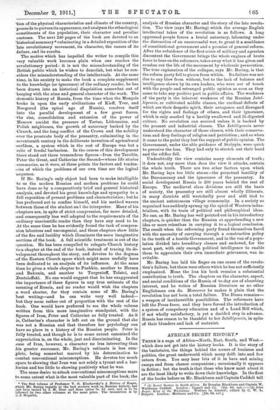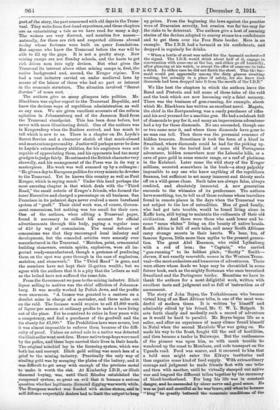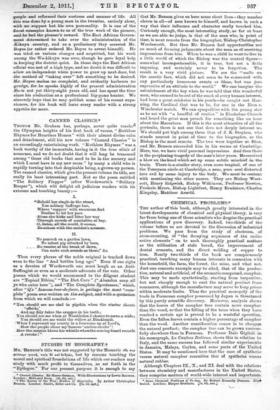AFRICAN SECRET HISTORY.*
• (1) Secret Service in South Africa. By Douglas Blackburn and Captain W. Waithman Caddell. London : Cassell and Co. [10s. 6d. net.]—(2) John Bops: King of the Wa-kilatyu. Written by himself ; edited by C. W. L. Bulpett. London : Methuen and Co. [12s. 6d. net.] THERE is a saga of Africa—North, East, South, and West— which does not get into the history books. It is the story of the backstairs, the things behind the scenes of business and politics, the great underworld which many drift into and few return from. You may hear bits of it in bars and mining camps and from chance companions ; occasionally it appears in fiction ; but the truth is that those who know most about it are the least likely to write down their knowledge. In the first of the books before us Mr. Blackburn and Captain Caddell tell part.of the story, the part concerned with old days in the Trans- vaal. They write from first-hand experience,and these chapters are as entertaining a tale as we have read for many a day. The writers are very discreet, and mention few names— .naturally, .for there are rich and respected citizens abroad to-day whose fortunes were built on queer foundations. But aayone who knew the Transvaal before the war will be able to fill up the gaps. It is not a pretty story. New mining camps are not Sunday schools, and the haste to get rich drives men into ugly devices. But what gives the Transvaal its interest above other mining camps is, first, the native background and, second, the Kruger regime. You had a vast industry carried on under mediaeval laws by means of the labour of those who had no part or interest in the economic structure.. The situation involved "Secret -Service " of some sort.
The authors give us many glimpses into politics. Mr. -Blackburn was cipher expert to _the Transvaal Republic, and knew the devious ways of republican administration as well as any -man. We are given excellent accounts of the reform agitation in Johannesburg and of the Jameson Raid from the Transvaal standpoint. This has been done before, but never with more illuminating detail. One of the authors was in Krugersdorp when the Raiders arrived, and has much to tell which is new to us. There is a chapter on Dr. Leyds's Secret Service and a character sketch of that much-abused and mostcurions personality. Justice will perhaps never be done to Leyds's extraordinary abilities, for his employers were not capable of appreciating them, and his opponents had too many grudges to judge fairly. He estimated the British character very shrewdly, and his management of the Press was in its way a masterpiece. His work was well Bummed up by a colleague : "He gives a dayto European politics for every minute he devotes to the Transvaal. -Yet be knows this country as well as Paul Kruger, which is saying much." Under this head perhaps the most amusing chapter is that which deals with the "Third Raad," the small coterie of Kruger's friends, who formed the inner Executive and charged a percentage on all business. San Francisco in-its palmiest. days never evolved a more barefaced system of "graft." Their chief work was, of course, Govern- ment concessions, but -nothing was too small for their care. One of -the authors, when editing a Transvaal .paper,
found it necessary to collect account for official advertisements through this body, paying a. regular sum of -210 by way of commission. The -usual defence of concessions was that they encouraged local industry and development, but the conceded articles were scarcely ever manufactured in the Transvaal. "Matches, paint, ornamental building stoneware, certain spirits, explosives, were all im- ported ready-manufactured, 'though a pretence of producing them on the spot was gone through in the case of explosives, matches, and stonework.". The " Third -Read " .is gone, and the members have not kept their ill-gotten wealth ; but we agree with the authors that it is a pity that the is as well as the bribed have not suffered the rime fate.
From the Government we pass to the mining industry. Illicit liquor selling to natives was the chief affliction of Johannes- burg. It was mostly worked by Polish Jews, and theprofits were enormous. "A licence was granted to a, canteen on a derelict mine in charge of a caretaker, and three miles out on the veld. The licensee would require to sell 21,000 worth of liquor per annum at ordinary profits to make a bare living out of the place. Yet he contrived to retire in four years with a competency, and find a purchaser of the goodwill and the. tin shanty for 21,000." The Prohibition laws were severe, but it was almost impossible to enforce them because of the diffi- culty of proof. Unless an actual sale to a native was detected the illicit seller went scot-free. Hence native trap-boys were used by the police, and these boys carried their lives in their hands. The original mischief lay in the licensing system, which was both lax and corrupt. Illicit gold selling was much less of a grief to the mining industry. Practically the only way of stealing gold was by scraping the plates of the battery, and it was difficult to get away with enough of the precious metal to make it worth the risk. At Kimberley I.D.B., or illicit diamond buying, was, until Cecil Rhodes established the compound system, so great an evil that it became a serious question whether legitimate diamond digging, wasworth while. The European market was flooded with stolen stones, and in self-defence respectable dealers had to limit the output to keep
up prices. From the beginning the laws against the practice were of Draconian severity, but evasion was far too easy for the risks to be deterrent. The authors give a host of amusing stories of the devices adopted to convey stones to a confederate and to get them over the Free State border. Here is -an example. The I.D.B. had a barmaid as his confederate, and dropped in regularly for drinks.
" When a bottle of stout was called for the barmaid understood! the signal. The I.D.B. would drink about half of it, -engage in. conversation with some one at the bar, and either go Off hurriedly,. after glancing at his watch, or accept the offer-of someone-to take- s drink. In either case he did not tinish,the stout. This the bar- maid would put apparently among the dirty glasses awaiting washing, but actually in a place of safety, for she knew that diamonds had been dropped into it from the mouth of the 1.D.B."
We like best the -chapters in which the authors leave the Rand and Pretoria and tell some of those tales of the veld and the bush which are now becoming only a faint memory.
There was the ,business of gun-running, for example, about which Mr. Blackburn has written an excellent novel. Magato, the chief in the -Zontpansberg, was a ready, purchaser of rifles
and his soul yearned for a machine gun. He had a calabash full of diamonds to pay for it, and many an impecunious adventurer' had a try for those diamonds. No one succeeded, though one or two came near it, and where these diamonds have gone to no man can tell. Then there was the perennial romance of hidden treasure. Sometimes it took the form of a kloof in
Swaziland, where diamonds could be had for the, picking up. Or it -might be the buried loot of some old Portuguese adventurer, hidden somewhere near the Lebombo hills, or a. cave of pure, gold in some remote range, or a reef of platinum in the Kalahari. Later came the wild story of the Kruger
millions, secreted somewhere -in the bush—a story palpably impossible to any one who knew anything of the republican finances, but sufficient to set many innocent and thirsty souls off on a wild-goose chase. Such tales are always false, always.
credited, and absolutely immortal. A new generation succeeds to the whimsies of its predecessor. The -authors
have something, too, to tell us of those recluses whom travellers found in remote places in the days when -the Transvaal was not subject to the law of extradition. Men of good family, who had got into trouble, would be found living alone in Kaffir huts, still trying to-maintain the rudiments of their old civilization. And there were -those who sank lower and be- came "mean Whites' 'Wing on -the 'bounty of native kraals.
South Africals TUll of such tales, and many South Africans carry strange secrets in their hearts. We hear, "too, of- -famous figures, little more than myths to the present genera- tion. The great Abel Erasmus, who ruled Lydenburg with a rod of iron; the ""Captain," who carried " gun-running " to its boldest pitch ; "Scotty " Smith- darunt, if not exactly verterabile, nomeu in the Western:Trans-
vmtl—the most audacious and humorous of adventurers. There were others whose deeds we hope may be chronicled in some
-future book, such as themighty Scotsman who once terrorized -Swaziland and the Portuguese border. Meantime we have to thank the authors for a most delightful work, written with excellent taste and judgment and as full of 'instruction as of
amusement.
The story of John Bogen, the Yorkahireman who 'became virtual king of an East African tribe, is one of the most won- derful of modern times. It is 'written by himsgif and admirably edited by his friend, 31r. C. W. L. Bulpett. It sets forth clearly and modestly such a record of adventure as it would be hard to parallel. Mr. Boyes began life as a sailor, and after an experience of many climes found himself in Natal when the second Matabele War was going on. He made his way to the front, fought till the end of hostilities, and then became a trader in Buluwayo. Bnt the restlessness of the pioneer was upon him, so with much trouble he wandered up the coast to Mombasa, and rode transport on the Uganda road. Food was scarce, and it occurred to him that a bold man might enter the Kikuyu territories and then organize some kind of food supply. With extraordinary courage and judgment he made friends first with one tribe and then with another, until he virtually stamped out native war and leagued the different tribes together by the ceremony of blood-brotherhood. For long his life was in constant
danger, and he succeeded by sheer nerve and good sense. He was as just and merciful as he was brave, and when he became " king " he greatly bettered the economic conditions of the people and reformed their customs and manner of life. All this was done by a young man in the twenties, entirely alone, with no support but his own personality. It is one of the finest -examples known-to us of the true work of the pioneer, and he had the pioneer's reward. The East African Govern- ment determined to take over the administration of the Kikuyu country, and as -a preliminary they arrested Mr. Boyes (or rather ordered Mr. Boyes to arrest himself). He was tried -on various charges and acquitted, but his work among the Ufa-kikuyu was over, though he gave loyal help in keeping the district quiet. In those days the East African cofficial was not of a high-type, and no doubt it was diffioult to :allow an independent white power to grow -up next-door, but the method ,of "taking over" left something to be desired. Mr. Boyes makes no complaint, and evidently harbours no grudge, for he speaks highly of the -present administration He-is not yet -thirty-eight years old,_and has spent the time since his abdication-aka professional :big-game hunter. We sincerely hope that he may publish some -of -his recent -expe- diences, for ;his book will leave every reader with a strong nppetitelor more.




































































 Previous page
Previous page